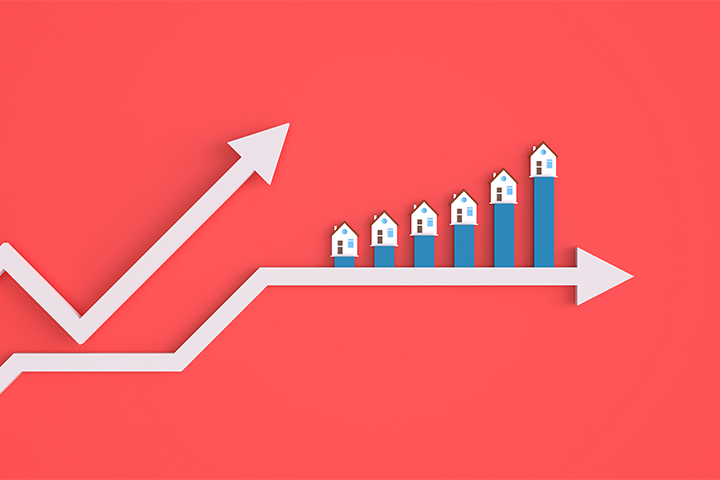It’s the question at the forefront of every real estate investor’s mind: When will the housing market stabilize?
On any given week, you might answer that question very differently. Just a few short months ago, no one would have predicted the impact of the Russian invasion in Ukraine and its ripple effects on the economy. Despite these unexpected factors, there is much that we do know and can predict about where the real estate market is headed over the coming months.
What We Know
Foreclosures have increased. In January 2022, there were 23,204 foreclosure filings, up 139% from the previous year. Recognizing this spate of foreclosures likely stemmed from those in the foreclosure process pre-pandemic and the resulting backlog, those total foreclosures are still far below pre-pandemic “normal” levels. As of March 2022, default notices continue to show a month‑over‑month increase. At the same time, government agencies and servicers’ loss mitigation efforts continue to try to slow this trend: The national delinquency rate fell last October to 3.74%.
The Prediction
Foreclosures will continue to reach and exceed totals we have not seen since even before 2018.
Housing inventory is still tight, with demand far outstripping supply. Some experts say it’s the lowest in a generation. And that low is not just due to the reluctance of builders to launch major development projects given the supply chain challenges of the past two years. The instability with interest rates are creating more challenges. The outlook: The adventure will continue. Supply chain shortages, impatient buyers, and a tumultuous balance of mortgage rates suggest 2022 will be just as much as or more of a challenge than during the pandemic.
The war in Ukraine and associated geopolitical tensions have created more demand for short-term debt, leading to sinking interest rates. Mortgage rates in early March fell under 4% in the largest two-day drop since March 2020—this, just when Federal Reserve was expected to raise interest rates in the very near future.
At the same time, Inflation is an ongoing worry for all sectors of the economy. Housing prices have risen by record numbers since 2020 and may continue to rise, but likely not at the current astronomical rates. Experts are predicting a continued increase in home prices but at a much slower rate in 2022, likely back to the more average rate of 4.2%, or even a bit lower.
The outlook: Housing prices cannot outgrow income potential forever. Low interest rates with low unemployment are not sustainable either. The fed will move conservatively to increase interests balanced with the concerns of a recession.
What We Can Assume Overall
However temporary, the increase in foreclosures means additional inventory coming to market. Investors would be wise to keep an eye on this space.
Fix and flippers can continue to leverage aging housing stock. With the median age of owner-occupied homes now at 39, a full eight years older than it was in 2005, and slower growth in new construction, more homeowners are buying older homes. The demand for rehabbed and updated property will only grow and remain as a supplement to the housing shortages.
Those looking for long-term rental opportunities will also reap the benefits of rental demand versus housing affordability. The largest growth area in real estate is not first-time homeowners. More investors are entering the market than ever before, and specifically in the rental market. In Atlanta, for instance, a full quarter of property purchases in 2021 went to investors.
There is no looming crash ahead, and home values won’t fall in any significant way. Experts, at least for now, don’t foresee a nationwide dip in home values.
What Happens Next
2022 is still quite young, and there are many unknown unknowns ahead. For now, the greatest and boldest prediction is this: Early foreclosure data suggest a great opportunity for real estate investors to provide the housing crisis with refurbished homes to buy or rent.
Interest rates and inflation are unpredictable insofar as we cannot predict the bigger forces at play. However, we do know that real estate will deliver returns to those willing to stay the course and ride out the occasional bumps in the road. With so much growth potential in the rental market, we expect to see more investors taking advantage of this opportunity—whether to diversify their portfolio or leverage new financial products on the market.
If there’s a new normal, it’s that the future can bring the unexpected. In the meantime, look for the opportunities and make educated investment decisions with the long view in mind.
Susan Naftulin is president of RFG, a company she founded with Jeffery Goldberg in 2009. Naftulin also serves on the American Association of Private Lenders Ethics Advisory Committee, working to uphold the real estate industry’s values and supporting professional conduct in private lending.
Naftulin has held several senior management positions in the mortgage industry, including general counsel, managing attorney, chief operating officer, and senior vice president for both privately and publicly held mortgage lenders. Before entering the mortgage industry, Naftulin was a creditors’ rights attorney with the Philadelphia law firm of Fox Rothschild LLP.
























0 Comments